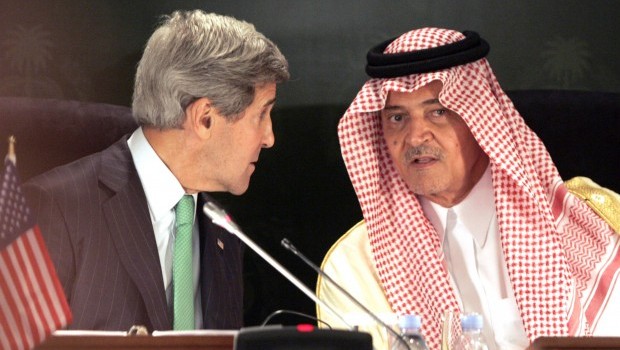In his recent trip to the Gulf, US secretary of state John Kerry said: “If the United States does nothing, and the rest of the world does nothing, then Syria is going to wind up in an even worse condition than it is today.”
This bizarre statement might have seemed less strange had it been issued by somebody else, particularly given that for the last two years and a half years, US officials have been bombarded with two main questions: ‘Why has the US done nothing to stop the massacres in Syria?’ and ‘Why has Washington overlooked the Syrian tragedy, given that Barack Obama has acknowledged that the death toll now exceeds 100,000?’
If Kerry is aware of what could happen in Syria if the international community continues to do nothing, why has the US overlooked this crisis which not only threatens Syria but the entire region, particularly following Iran’s blatant military intervention to support Assad? Does Kerry realize the worst scenario that could play out in Syria? For him, the worst scenario is represented by the prospect of the country being fragmented and radical extremists laying their hands on chemical weapons which they could then use freely against the West.
In fact, Washington’s disregard for the intervention of Iran in Syria, along with its agents, namely Hezbollah and Asa’ib Ahl Al-Haq, will have disastrous consequences.
First, turning a blind eye to Iran’s growing embroilment in the battles in Syria will allow Tehran to extend its influence in the region, particularly after Ali Khamenei announced that “[Iran] will not let Syria fall into the hands of [its] arrogant enemies.”
In a related context, many political analysts believe that the crushing of the Syrian opposition will allow Iran to take over Lebanon to the west and irrevocably take control of Iraq to the east. Iraq could also serve as a platform for Iranian ambitions in the Gulf.
Meanwhile, Iran is seeking to infiltrate Yemen by means of mobilizing the Huthi movement, who have recently received intensive training and advanced weaponry. This latest development prompted Ali Al-Omrani, the Yemeni information minister, to say that Iran’s intervention in Yemen poses a greater threat than Al-Qaeda, while Tehran’s move to take control of Bab El-Mandeb is more dangerous than its nuclear ambitions.
It is the duty of US officials to sense this danger that is far more serious than all of their alleged fears of extremists taking over Syria, particularly after Tehran broadcast footage of volunteers registering their names at recruitment centers to fight in “Iran’s 35th state” [Syria]. Besides this, Iran announced it had widened its security borders to the east of the Mediterranean. This is not to mention that Tehran announced that it intervened in Syria in order to prevent the collapse of the “resistance front.”
Second, Kerry has not gone far enough in warning against the dangerous risks of this conflict taking a sectarian form, creating tensions between Sunnis and Shi’ites across the region. This is something that will doubtlessly affect the entire Middle East, rather than just Syria, Lebanon and Iraq; this conflict could potentially shake international stability and even undermine the Western economy.
Kerry accuses Iran of internationalizing the conflict in Syria by means of Tehran and Hezbollah’s growing military intervention, yet he insists that the US is not necessarily pushing to secure a military victory for the opposition; rather, he says that it is seeking to pressure Assad to enter into negotiations and attend the Geneva II conference. However, this stance only serves to give Iran the green light to continue fighting in defense of the Assad regime. This is a state of affairs that marks the beginning of the decline of the US influence in the region after 30 years of expansionist plans and interference.
This week in Kerry, Prince Saud Al-Faisal and Prince Bandar bin Sultan must have told Kerry the same things they told the French two weeks ago. They will certainly have told Kerry of the risks of ignoring Iran’s intervention in Syria, something that will allow it to gain control of Lebanon and Iraq and thus further interfere in the region’s affairs. This is something that will stir up sectarian hatred and raise concerns in the Gulf States. In fact, Iran’s growing influence in the region even poses a risk to the US and the West, which both appear reluctant to support the Syrian opposition, turning a blind eye to the worst massacre of the age.
Syria cannot bear Washington ignoring this terrible death toll and seeking to achieve a sort of military balance in the battlefield and thus persuade Assad to go to Geneva II. In fact, while the US brings every single bullet transferred to the Syrian opposition under scrutiny, it overlooks the heavy Russian arms and the Iranian fighters flooding the country on the side of the regime.
This is why Saudi Foreign Minister Prince Saud Al-Faisal was decisive when he told Kerry that Saudi Arabia would not stand idly by, watching what is happening in Syria. The Saudi Foreign Minister stressed that Syria today is akin to an occupied territory, adding that this requires a firm stand and rapid international action.
